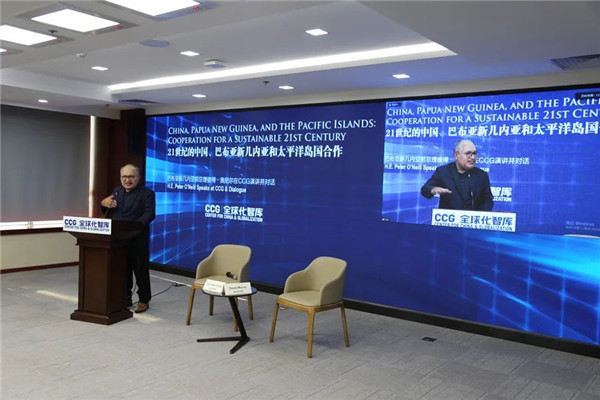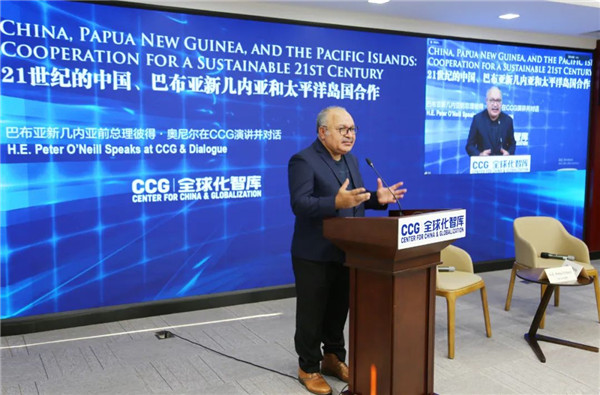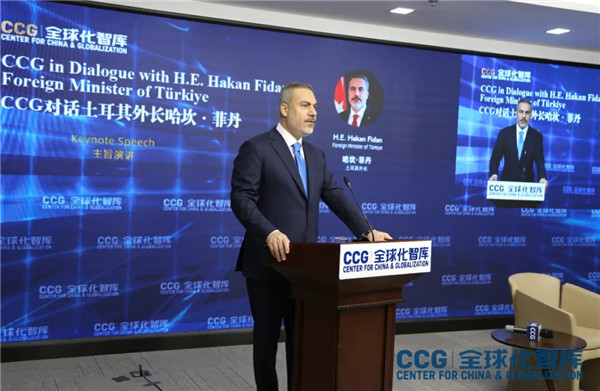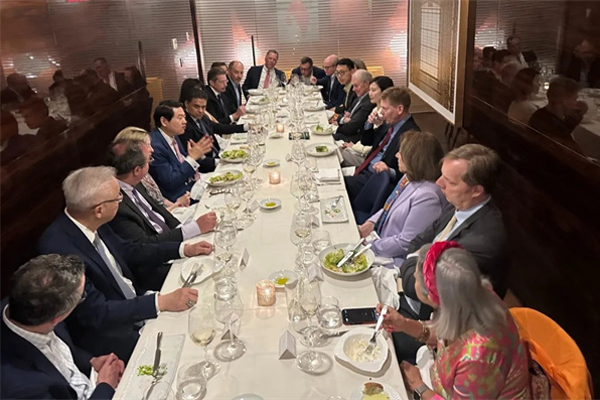TEXT | Peter O’Neill: Cooperation for a Sustainable 21st Century

On July 5, 2023, Peter O’Neill, former Prime Minister of Papua New Guinea, gave a speech at the Center for China and Globalization (CCG). The following is the full text of the speech:
Thank you very much. Thank you for hosting me here today and also invited me to this Center for China and Globalization, in Beijing and the series of dialogue that’s going to take place over the next few days. I’m greatly honored to be here.
First let me say that China has been a great friend of Papua New Guinea for many years. Papua New Guinea got independence in 1975. I think China was one of the first countries that we established diplomatic relations with. Close to 50 years ago, we saw the great opportunity that this relationship provided us. It was largely also because we have had some strong, very close relationships before with many of the settlers who migrated to our country from China, I think, close to 200 years ago, some of the first Chinese settlers settled in our country. Many of them continue to play leading roles in our country, in business, in politics and in communities. Many of them are now third or fourth generation Papua New Guineans, who love our country and still believe in the greatness of China. The experience of opening up for development has been very challenging, because like many Pacific Island countries, we are very small in the global terms, but Papua New Guinea is by far the biggest country in the Pacific with close to 17 million people. Compared to many of our other smaller pacific island countries, we are quite large.
With that large population, it comes with a lot of challenges, because many of our population live in rural communities. Just like China was some 50 years ago, many of your population lived in the rural communities and China’s ability to bring that population to a middle class income and population to a better standard of living is something that Papua New Guinea has been aspiring to lead that kind of example and follow.

Because of ours is a very different style of government. We are democratically parliamentary elected government where governments continue to change as many of when leaders change the policies of government change. And some are good policies, some do not quite match up to the expectations of our people. So it has been a huge challenge. As a result, we have a situation where we have a huge population of young people, just under 60 % of our populations, age of 25 years old. Most of them are not well educated. So when governments like mine were in government, we had free education policy where every child was supposed to be able to go to school without their parents, who are very low income, and people who are unable to afford school fees, we were able to translate that we increase the enrollment by well over 100 %.As a result, we had close to 2.5 million young people in schools right through the country. That program has led to a improvement in the literacy level within the country. Health and education is a strong foundation for the social well being of any country’s population. I think investments in those areas have got to create a good and a huge opportunity for each individual family and each individual community and person.
The leadership’s challenge in public today is how to address the lack of opportunities that young people have in our country. And China has been a great partner. Over the last 20 years of relationship with Papua New Guinea, which has been quite strong, I’ve been part of a government that has been very progressive prior to. It was a government led by our founding father Somare. His policies and my policies were mainly aligned to emulating what China has been doing over many years. Ours has been trying to get the rural communities. As China has experienced, we also have similar experiences, even though in a smaller scale, the migration of young people from rural communities into the cities, looking for better opportunities and trying to provide for that migration has been challenging, because of lack of infrastructure, not enough schools, not enough education services, not enough infrastructure.
So over the last 20 years, China has been a huge investor in PNG by providing access to finance, providing access to the experience of many of their contractors who were able to build infrastructure for us. So, we have had an opportunity to build many schools, many hospitals, many roads, many airports, and infrastructure that is changing the lives of individual families and individuals. PNG is a very resource rich country. It’s not poor, but it’s letting in capital to develop those resources and getting the right partners to come in and participate in the development of those resources. And our part, is making sure that those investors know the rules of engagement in our country and that policies do not change in a regular basis where it is detrimental to the investors. So we lack foreign direct investment and China is now starting to become the largest investor in our country. You will see in many parts of our cities and towns throughout the country. Many of the Chinese businessmen are fairly well located in each of these communities, actively participating in the day to day lives of our people, both in business and politics and of course, in community affairs.
So I think that Papua New Guinea’s challenges are that we must continue to stay away from the the issues that are running around with the geopolitics of our region. Countries in the Pacific, especially the smaller countries, they have no ability to advance the course of geopoliticsin the debates that are going on. This is about improving the lives of the individual population that each country has. But unfortunately, we get dragged into it. And over the last 48 years or so, over the relationship between PNG and China, we have always had this policy of maintaining a very strong link with China itself. And I think that the future is bright for both countries. Our population is growing, and within the next decade or so it will bypass Australian population because Australia’s lack of migration mean the numbers are not as high as they used to be. And families have been having lesser and lesser children and as a result, their population is not growing at the same level as Papua New Guinea. It will become a very important country in terms of the population, also the size of the economy. In the last 20 or 30 years or so, our GDP has been doubling, our economic growth has been just following China between 5% and 8 % generally over the last 20 years, except during the COVID period and the years after that.
But there is a great opportunity for us to continue to strengthen the relationship between the two countries that we have.
And I think that the discussions that are going on, as I said earlier, about the issues around the security arrangements and defense cooperation arrangements that have been discussed in the region. My views have been very public and very upfront that particularly Pacific Island countries to stay clear of those discussions, we should focus on economic and trade and people to people relationships. That’s where it matters most. We know of China’s great achievements over the last 40 years or so, where you are able to move, as I said earlier, hundreds of millions of people. In our human history, nothing of that has ever happened before. And China needs to be very proud of its achievements that you are able to move over 300 or 400 million people from low based income level to a middle-income situation, which is really lifted the standard of living for your people. That is the experience that countries like Papua New Guinea need.
We are not really interested in issues of security arrangements. We are not in any conflict with anyone. I think the Pacific is big enough for everyone. I think you will find that both China and many of the other players in this debate are all living within the Pacific. It’s up to us to protect the Pacific. There are greater challenges before us like climate change and population growth that many of the other countries within the region, especially the Asia-Pacific region, are facing. That needs our immediate attention. I think those are focuses that we should be focusing on.
But in all, I think we have a very healthy relationship between PNG and China. We were very honored to welcome President Xi Jinping in 2018 when we hosted the APEC meeting in Papua New Guinea. He is a great friend of Papua New Guinea. I have had an opportunity to meet and engage with him almost 14 times in 8 years. For us in the Pacific, you don’t get that opportunity to meet your leader at that kind of engagement. It has been a great exposure for Papua New Guinea. And that has given us a lot of encouraging outcomes where we are able to see the sort of development that PNG has been able to achieve.
But once again, thank you very much for giving me the opportunity to be here with you and spend a few minutes talking about my country to you young people and our distinguished friends from CCG. It’s a great honor to be here.
I am hoping that next time I’m back, I’ll get some of our young people who are really engage in in the meaningful discussions and debates about the future of our world and especially the future of our region within the Pacific and Asia-Pacific region.
I’m hoping that I can be able to refer them to you, so you can continue to dialogue with them and give your experience and see how they can mitigate some of the challenges that they have in their communities and in their families. Once again, thank you very much. And thank you for hosting me today. Thank you.
Note: The above text is the output of transcribing from an audio recording. It is posted as a reference for the discussion.





